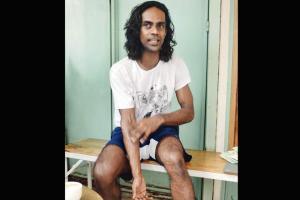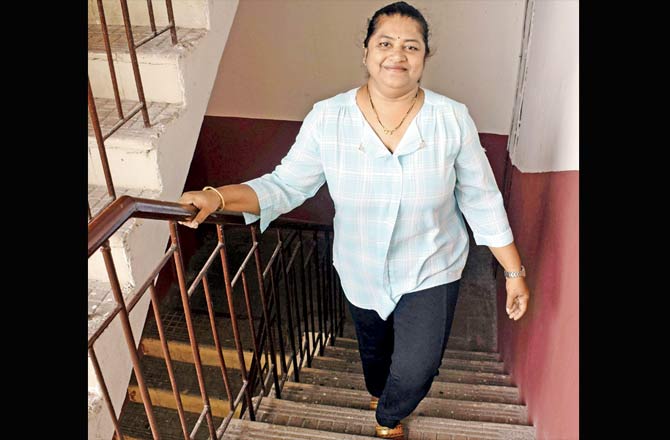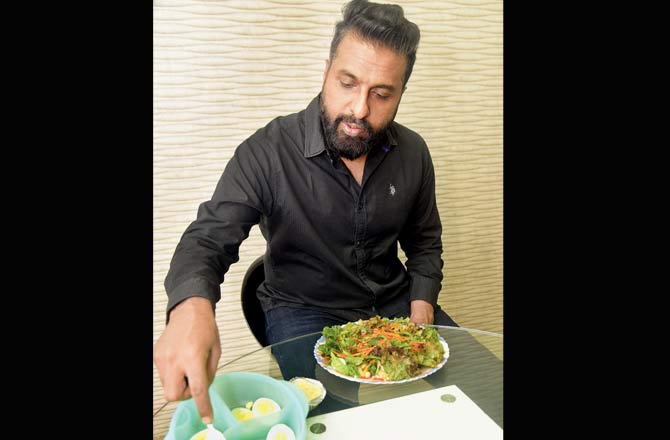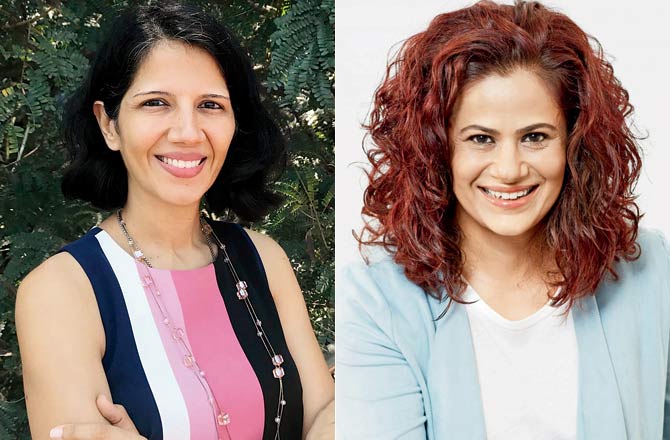For a culture that celebrates everything with kuch meetha, the fasting diet is spreading fast. And Mumbaikars are quite happy to not eat for periods extending to 24 hours or more

Tre Munroe. Pic/Sayyed Sameer Abedi
When Tre Munroe walks into Bandra's Kitchen Garden at 3.15 pm, he looks energetic and happy. Considering the blazing October heat and that we are seated in the al fresco area, he already sounds like Superman. That he's returned from an intensive job at JNPT (where he has been since 11 am) adds to this cape. But, wait, there's more. Munroe, 32, hasn't had breakfast or lunch. In fact, aside from black coffee and water, he hasn't ingested anything since the previous night. "My last meal was a cup of chocolate milk at 11.30 pm," he says. Since waking up at 6 am, he has done some yoga stretches (and you only have to see his feed on @chiefwowow to know that it's unlikely that they are lazy stretches), gone to JNPT where as a safety officer he coordinates & facilitates courses on "lift operations" for heavy marine equipment. What he is having with us is his sixth cup of coffee. His next meal is still a few hours away.
ADVERTISEMENT
Munroe sounds like Superman. But, he isn't the only super in Mumbai. For a city obsessed with eating — dinner dates, lazy luncheons, power breakfasts and Sunday brunches and diets that revolve around what's the next big superfood — there's a fast-growing breed of people that have taken to intermittent fasting. Abbreviated to IF, it's not just the best diet to help you look good, but also feel good, say its practioners. It requires fasting periods of minimum 14 hours per day. It can extend to 24 hours, 36 hours or even five days. Most people on the diet, that mid-day spoke to reported feeling healthy, energetic, lighter and happier.
Tre Munroe
Safety officer and trainings coordinator, at JNPT and movement trainer
Last meal of day: Choco milk at 11.30 pm
Next meal: post 6.30 pm
IF for longevity
What happens to the body when you eat? You store some of the energy from food in the liver as glycogen. But after 10 to 12 hours of fasting, glycogen reserves are extremely low — the state we now call "hangry". However, this is also when — with little glycogen left — the body starts using fat as a source of energy, instead of sugar. With fat in the body depleting, weight drops automatically. But, it's not just a better relationship with the weighing scale that the IF might help you with. A joint research published in September 2018 in the journal, Science Direct, conducted (among others) by researchers from the US-based National Institute on Aging, reported that daily fasting improved health of male mice, independent of diet composition and calories.
The mice were divided into three groups of feeding pattern: ad libitum (AL) [i.e. feeding as they desired], 30 per cent calorie restriction (CR), and single-meal feeding (MF), accounting for differences in energy density and caloric intake consumed by the AL mice. The report states: "MF and CR regimes enhanced longevity regardless of diet composition, which alone had no significant impact within feeding regimens. Like CR animals, MF mice ate quickly, imposing periods of extended daily fasting on themselves that produced significant improvements in morbidity and mortality compared with AL. These health and survival benefits conferred by periods of extended daily fasting, independent of dietary composition, have major implications for human health and clinical applicability."It is, in fact, a search for a healthier lifestyle for his father that brought Goregaon resident, Sudhish Balan to IF.
Moving on from Keto
Balan, a 45-year-old digital marketer for the Malad-based firm Tonic Worldwide, says five years ago, he started hunting the web and any medical material available to find some help for his father. A diabetic patient, Balan's father had also lost vision in one eye, and medicines and better exercise weren't helping. Chancing upon the keto diet — which is low on carbs, high on fat and protein — he first decided to try it on himself. After the initial phase of keto-flu, his body adapted and within one-and-a-half months, he lost 4.5 kg. "I kept checking my blood cholesterol, as the worry was that since I ate fats and meat, it would shoot, but all the reports returned normal. In fact, cholesterol levels dropped," he adds. His father soon went on keto and his sugar levels almost came under control. "From a daily insulin dose of 75 units, his requirement has dropped to 10-15 units. And on some days, it's lesser," he adds. While Balan's father soon got off keto, even though he now keeps carbs to a minimum, Balan's own research into food and its relationship with the body continued. Two years ago, he started reading up on IF.

Pavitra Tandel, sports masseuse
Last meal of day: 10 pm
Next meal at: 1.30 pm
In the meantime: Coconut water and diluted chaas
He says he'd devour everything from white papers on the subjects and particularly recommends videos and Ted talks by US based Dr Eric Berg, who even answers to questions relating to IF from visitors to the site. Balan also mentions Dr Yoshinori Ohsumi, a Japanese cell biologist, awarded the Nobel Prize in Physiology or Medicine in 2016 for his discoveries related to autophagy, a Greek term for "self-eating." Simply put, autophagy is the process when cells break down proteins and nonessential components and reuse them for energy. In autophagy cells destroy invading viruses and bacteria, getting rid of damaged structures. This essential process is believed to go awry in cancer, infectious diseases, immunological diseases and neurodegenerative disorders. Disruptions in autophagy are also thought to play a role in ageing. One of the three ways to trigger autophagy in humans is fasting (exercise and low-carb diet are the other two).
What do they eat?
Pavitra Tandel, 42, is a sports masseuse whose day begins at 7 am. Till a month ago, her breakfast would include four chapatis and sabji, before leaving her Mahim home and heading to anywhere between Borivli and Nepeansea Road. Never having gone on a diet or exercised much — "I just didn't feel like it" — IF seemed like a great option for Tandel. After all, all you have to do is skip a meal. She eats dinner at 10 pm and breaks her fast around 1.30 pm, coming home for lunch. In the last one month, she says, she has already shed five kilos and her waistline has also gone down. Now, her two meals in the day — IF recommends that you take the day's calories within two meals during the feeding time — consist of chapati, bhaji and/or chicken or fish cooked in the traditional way with coconut. If she feels a drop in energy or hunger strikes, she drinks coconut water or very light buttermilk during her fasting period. Sugar, tea and coffee have been cut out completely, except for maybe a glass of black tea in the morning.

Sudhish Balan digital marketer, Tonic Worldwide
Last meal of the day: 9 pm
Next meal at: 2 pm
Kills hunger with: Bulletproof coffee
When Balan eats now, it's mostly keto meals. He avoids gluten and puts in more vegetables to ensure a balanced diet. There are two drinks he swears by to get him through hunger pangs — bulletproof coffee (black coffee with two tablespoons of ghee and coconut oil) and apple cider vinegar with a pinch of Himalayan salt. Munroe's diet consists of a lot of nuts, fruits, sprouts, and meats like chicken and fish, salads that include colourful veggies (think carrots, beans, cabbage, broccoli), rice and scrambled eggs and seeds like pumpkin and flax. Of course, sticking to these in all situations proves tough. When attending a birthday for instance. Sometimes, eating a cake or a croissant is inevitable. "You can't open your Tupperware tiffin with a health meal just about anywhere".
While Tandel now feels more energetic and wants to start walking more, Balan and Munroe do work out. Munroe, in fact, is a movement trainer and often gets in at least a hour-and-a-half's work out, including a 30-minute run, before 8 am. With an ectomorphic body it seems counterintuitive that Munroe would take to IF, lauded for weight loss benefits. However, while sipping on his coffee, he feels healthier now than when, having joined a gym a few years ago, he ate till he thought he was full "up to his neck". It was a constant state of discomfort. And any muscle loss due to hours of fasting? You only have to see his arms.

Dr Roshani Sanghani and Shonali Sabherwal
A culture of fasting
It almost seems intuitive to Indians that fasting has health benefits. We have all done it at various times for religious reasons. In fact, various festivals are known for their required fasting periods. Dr Archana Juneja, consultant endocrinologist at Andheri's Kokilaben Dhirubhai Ambani Hospital, says we have seen ancient sages and even our grandparents take to it. Not eating after sunset (common in the Jain community for instance) and then eating breakfast post 7 am. "There's some rationale to it, in terms to detox, but it would apply to certain groups of people," she says, adding that this will also bring in correction of metabolic factors, for instance those in the pre-diabetic stage. The caveat here is that — unlike what is propagated — you don't get to eat just about anything you want. A balanced, nutritious diet is important. She warns that nutritional deficiency is a common side-effect of the fasting diet, something those taking to it should watch out for. A weight loss of 2-3 kg per month is healthy, anything more could cause liver damage.
Diabetologist Pradeep Gadge brings to mind the Varshi Tap, a religious fast common among members of the Jain community, where his patients eat only one meal a day, surviving the remaining hours on water. Patients on IF, he says, often don't take their diabetes and thyroid medication at the requisite timings or balance it with the diet needed. "I have seen dangerous sugar fluctuations in patients, who are diabetic and on IF, who finally ended up with hypoglycemia," he adds.
Doing it right
Like Balan, 42-year-old Tabrez Siddiqui also graduated to IF from keto. "I started last year in October and it was going good, so long as I was carrying a tiffin from home. I was doing the 18:6 fasting: eating pattern. But then I changed jobs in December, which is a sales role and required me to be on the go. It's a high-pressure job." When hunger struck, he'd eat anything he laid his hands on, but it proved tough. Eventually, he started eating just one meal and stopped the no carb, no sugar pattern. The result was that soon he started putting on weight, hitting 78 kg from 75 kg. Realising that this was not the diet for him, Siddiqui has now moved away to just eating all meals, but keeping it balanced.
It's something that Shonali Sabherwal, macrobiotic nutritionist and chef, argues for. The pattern she sees is people eating till late at night and then fasting the whole day. "If your last meal is at 6.30 pm and breakfast is at 8 am, that's already a 12-hour cycle. Your body needs the break for digestion," she says, adding that a lot of people, who may end up eating late, eat their first meal at noon, but use coffee to stay full. "Coffee is not fuel. Skipping breakfast — which should be the largest meal and foundation of the day — I don't agree with. We need sustained sugars from whole grains with a concentrated amount of protein coming in," she says. The body, she believes, follows a circadian rhythm. It's the lowest at 6 pm, and so the lightest meal should be then. The organs she says also go into rest after sunset and so that's when the body needs to stop being fed. "You can't just look at the hours, you need to see how the body is utilising the food."
Diabetes reversal
At Dr Roshani Sanghani's Khar West clinic, Aasaan Health Solutions: Diabetes and Endocrine Centre, since June approximately 100 patients have already been put on IF. But, it was a slow process. Sanghani says she first watched a few YouTube videos on IF by Dr Jason Fung last September. Then she and her team started reading the books on the subject — The Obesity Code, The Complete Guide to Fasting and more recently, The Diabetes Code. Convinced that answers to weight and type 2 diabetese management lay not in a low fat diet, the American Board Certified consulting endocrinologist, believes the answer may lie in IF. However, she clarifies that this does not apply to those with Type 1 diabetese (where the body is not producing insulin), but to those with Type 2.
She calls to attention the drug-insulin-food vicious cycle, in which eating food every few hours is needed to avoid low blood sugar side effects of certain drugs, but this also causes a rise in insulin levels which leads to central obesity. To treat insulin resistance she says we need to keep off drugs that raise insulin levels. Those with diabetes, or even treated medical conditions like anemia and high blood pressure, she adds, need to consult their doctor before getting on IF. She recommends a 36-hour fasting period to her patients (they start on IF in a slow progression from 16 hours onwards) in which all they consume is fasting liquids: water, fresh lemon water with Himalayan salt, green tea, black coffee or at a pinch, tea or coffee with two tea spoons of milk or fresh cream. The patients are also allowed vegetable broth in her medically supervised a diabetes reversal programme. After 24 hours, the sugar stores start depleting and the body starts to burn stored fat. The fasting hours that the patients keep, she says, depends on what they prefer as per their lifestyle. She lists a series of positive results observed in her patients from improved blood sugars to improved blood pressure, reduction of acne in polycystic ovarian syndrome, reduced acidity, less migraines, and - relief from niggling aches and pains.
Caveat Emptor
It may sound like the miracle drug everyone has been waiting for. The ancient wisdom that science will eventually prove. There have been suggestions of five-day-water-only fasts for improvement in cancer patients. But science hasn't caught up yet. And everyone, especially the doctors, will remind you of this. Is this diet for you? A report by researchers Ruth E. Patterson, and Dorothy D Sears, titled, Metabolic Effects of Intermittent Fasting, in the Annual Review of Nutrition concluded: Large-scale randomised trials of intermittent fasting regimens in free-living adults are needed and should last for at least a year to properly assess whether behavioural and metabolic changes are sustainable and whether they have long-term effects on biomarkers of ageing and longevity.

Don't fast if you are
- Pregnant
- Underweight
- Suffer from a medical condition
- Nutrient deficient
Catch up on all the latest Mumbai news, crime news, current affairs, and also a complete guide on Mumbai from food to things to do and events across the city here. Also download the new mid-day Android and iOS apps to get latest updates
 Subscribe today by clicking the link and stay updated with the latest news!" Click here!
Subscribe today by clicking the link and stay updated with the latest news!" Click here!






